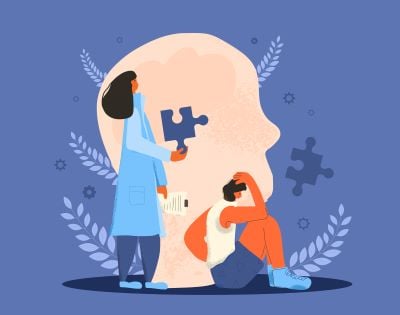Treating Anxiety Disorders, Part 1 (of 6): The Power of Anxiety
Licensed clinical social workers, psychologists, and other therapists can successfully treat disabling anxiety disorders. Video produced by AnxietyTraining.com


Licensed clinical social workers, psychologists, and other therapists can successfully treat disabling anxiety disorders. Video produced by AnxietyTraining.com
A young woman with OCD learns how to manage her OCD and finds out it no longer controls her. Video produced by AnxietyTraining.com
Methods clinicians use to treat anxiety disorders: medications (psychopharmacology), cognitive-behavioral therapy (CBT), complementary treatments. Video produced by AnxietyTraining.com
A licensed clinical social worker describes how cognitive-behavioral therapy effectively treats anxiety. Video produced by AnxietyTraining.com
Details about how to implement cognitive-behavioral therapy (CBT) in treating anxiety, specifically using exposure and response prevention (ERP), cognitive restructuring, behavioral experiments (exposure to anxiety triggers)
Video produced by AnxietyTraining.com
How complementary approaches to treating anxiety can be effective, including family therapy, mindfulness (acceptance), exercise, yoga, and breathing. Video produced by AnxietyTraining.com
PTSD is an illness that people may develop months after experiencing or witnessing a life-threatening event, including a terrorist attack like 9/11; combat; earthquake, tsunami, hurricane, tornado, or other natural disaster; serious auto or plane accidents; personal assault or abuse; or the sudden death of a loved one.
Funding for this video provided by a grant from the American College of Neuropsychopharmacology (ACNP)
If you are in crisis please dial 988 for the Suicide & Crisis Lifeline. Please note that ADAA is not a direct service organization. ADAA does not provide psychiatric, psychological, or medical advice, diagnosis, or treatment.
Founded in 1979, ADAA is an international nonprofit organization dedicated to the prevention, treatment, and cure of anxiety, depression, OCD, PTSD, and co-occurring disorders through aligning research, practice and education.